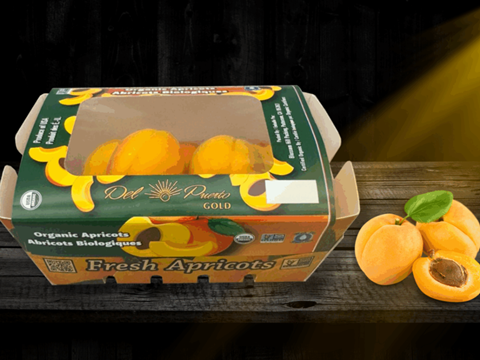
Blossom Hill has adopted a fibre-based, linerless packaging format for its apricots – said to be a fully recyclable, PFAS-free alternative to plastic clamshells and backing paper.
Developed by Paper, Pulp & Film and printed by Superior Litho, the TrayCycle trays are designed to balance environmental benefits with functionality and shelf appeal – targeting fresh produce, prepared foods, and foodservice meals.
Meanwhile, Reflex Group’s linerless lids are intended to lessen material waste, negate the need for backing paper, and streamline both production and recycling. The automated Ravenwood Nobac 5000 applicator is said to apply lids to over 50 packs per minute, achieving precision and consistency while delivering ‘substantial’ labour savings.
Additionally, the pack features a custom window design for product visibility and presentation. The design facilitates full-surface branding and made its debut at major American and Canadian retailers during California Apricot season.
“We’re proud to support Blossom Hill Packing with a linerless solution that delivers both speed and sustainability,” said Tal Cloud, president and owner of PP&F. “The Nobac 5000 not only reduces labour costs with high-speed automation but also helps set a new benchmark for product visibility and presentation in fresh produce.”
Another recyclable tray with a linerless lid was revealed by Tesco and Zespri earlier this year. Used to package the latter’s kiwi line, the solution sought to achieve carbon footprint reductions and transition away from the traditional plastic flow wrap.
In similar news, Ravenwood recently participated in a partnership with Siegwerk to drive the adoption of linerless label solutions across the packaging industry, aiming to cut down on material waste and transportation costs.
If you liked this story, you might also enjoy:
The ultimate guide to the Packaging and Packaging Waste Regulation in 2025
How are the top brands progressing on packaging sustainability?
Everything you need to know about global packaging sustainability regulation in 2025
The key to increasing the use of reusable packaging in supermarkets














No comments yet